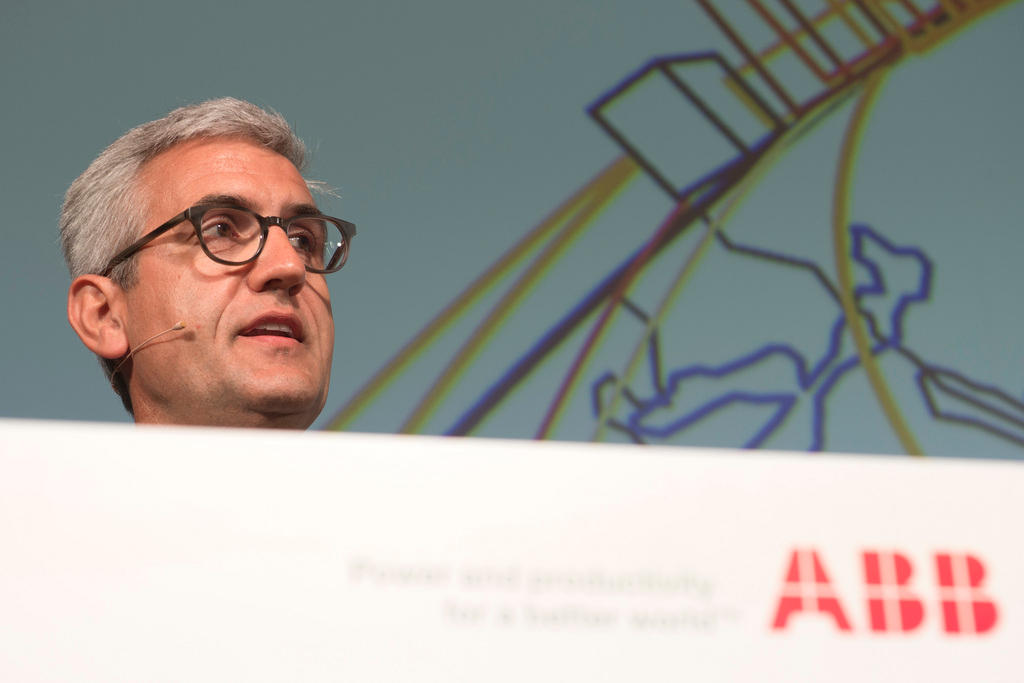
ABB chief Ulrich Spiesshofer under pressure to reinvent group

The strange and cumbersome corporate beast that is the industrial conglomerate must adapt — or die.
In the US, General Electric’s share price has collapsed since its troubled power equipment division slumped to a loss and concerns grew about its financial health.
In Switzerland, speculation swirls over Zurich-based ABB, which is in talks with Japan’s Hitachi about divesting all or part of its power-grids division.
In the limelight is Ulrich Spiesshofer, ABB’s Germany-born boss since 2013. A company veteran, he transformed ABB’s robotics division, which is now its fastest growing unit.
As chief executive he has cut costs and focused the group, which has annual sales of $34 billion, around four pillars: industrial automation and electrification, as well as robotics and power grids.
Yet ABB continues to underwhelm investors. Its share price has fallen 20 per cent over the past year, compared with 13 per cent at German rival Siemens. (GE is down 55 per cent).
Two years ago, Spiesshofer resisted calls for a break-up from Cevian Capital, the European activist investor which holds a 5 per cent stake. More recently, his mind appears to have changed.

News about a possible sale of the power-grid division initially lifted ABB’s share price; investors prefer simpler companies doing fewer things.
That might appear to be further evidence of the weaknesses of a conglomerate model, but ABB’s actions could also demonstrate the opposite: that the species can adapt and make itself fit for the future.
The case against conglomerates is that market efficiencies are greater when shareholders select their own portfolio mix.
The argument for conglomerates is, partly, that bringing businesses under one roof creates synergies, such as through sharing clients or supply chains. It is also that experienced managers are better at knowing whether, when and how to reshuffle portfolios.
Despite their slovenly reputation, industrial conglomerates can be surprisingly agile. My favourite example is Mannesmann, the German steel pipe manufacturer, which in the late 1990s transformed itself into a telecoms company — and was then bought by the UK’s Vodafone for £112 billion.
Currently, portfolio management is in full swing at the world’s biggest conglomerates. GE is shedding businesses in a frantic attempt to raise cash and refocus.
In a more orderly fashion, Siemens is overhauling its ailing power and gas unit while awaiting regulatory approval for a railway merger with France’s Alstom.
At ABB, action is clearly needed, despite avoiding GE’s biggest pitfalls. It exited the power generation sector, which is waylaying GE and Siemens, in 2000.
Unlike GE, ABB has not moved into financial services. Nor has it obviously overpaid significantly for recent acquisitions or fallen victim to management hubris. “GE are great at marketing — they are also great at bullshitting,” said one Swiss-company watcher.
But Spiesshofer has failed to return ABB to the sustained growth needed to secure his job as chief executive.
Under him, the Swiss group has earned a reputation for promising a turning point — only to then disappoint. Revenues have been broadly flat over the past four years as Spiesshofer has chopped out less profitable bits of the business.
Spinning off the power-grid division — or ideas for a more radical ABB break-up that have been floated by some analysts — would not solve that strategic challenge directly.
Spiesshofer has previously cited the costs of carving out the power-grid unit. Industrial infrastructure companies also need global clout in markets.
James Stettler, analyst at Barclays, said: “I worry about infrastructure businesses [such as power grids] which are exposed to China — because China is becoming an increasingly powerful competitor. If a buyer came along, great — if not, would it really be better outside ABB?”
Nevertheless, a portfolio reshuffle could see ABB’s shares trading nearer the higher multiples of “purer” industrial companies.
A portfolio shake-up would also be a chance to strengthen ABB in the growth markets of the future — using the proceeds, for instance, to fund a big push into artificial intelligence.
ABB watchers also see a need to invest more in marketing; ABB’s conservative approach to salesmanship stands in contrast with GE’s chutzpah. To survive in the jungle, a threatened beast has sometimes to make a leap.
Copyright The Financial Times Limited 2018

In compliance with the JTI standards
More: SWI swissinfo.ch certified by the Journalism Trust Initiative




























You can find an overview of ongoing debates with our journalists here . Please join us!
If you want to start a conversation about a topic raised in this article or want to report factual errors, email us at english@swissinfo.ch.